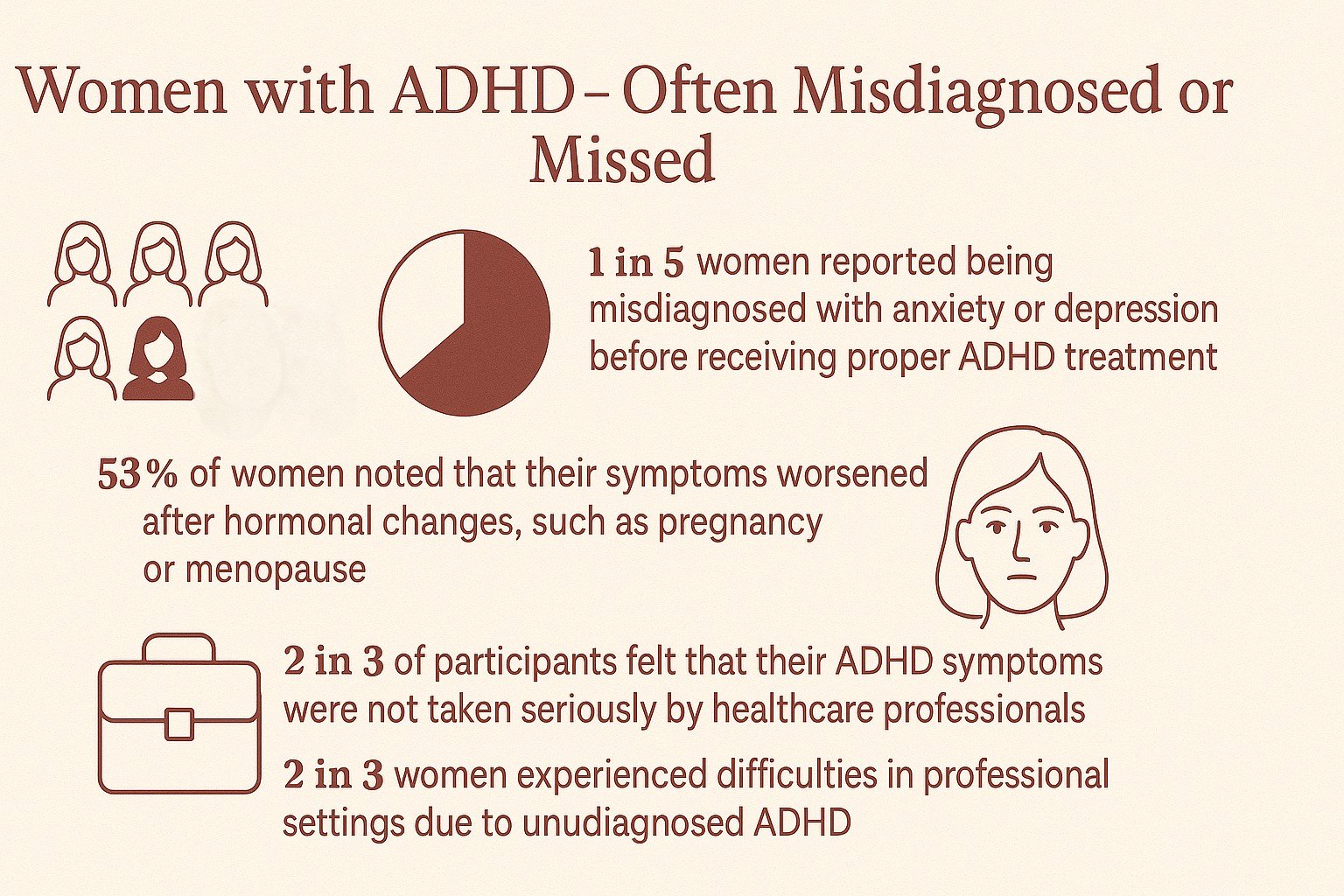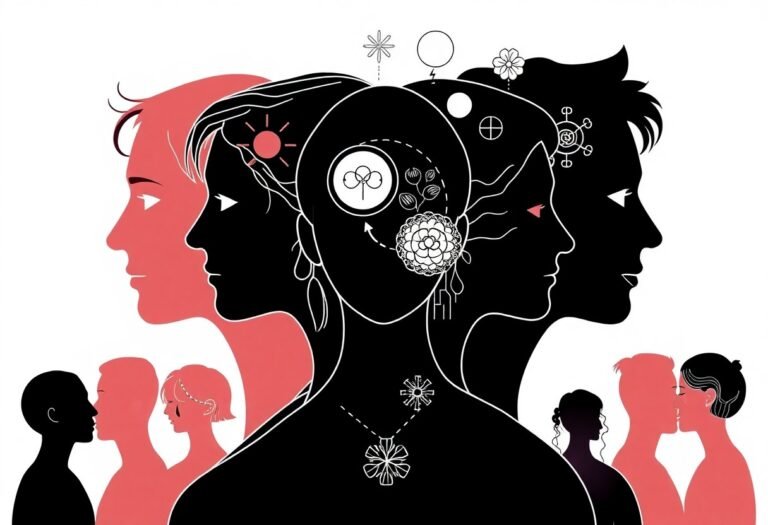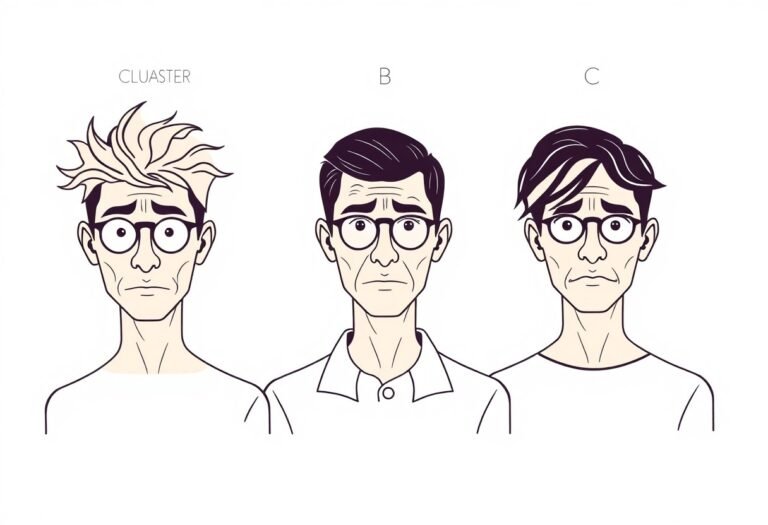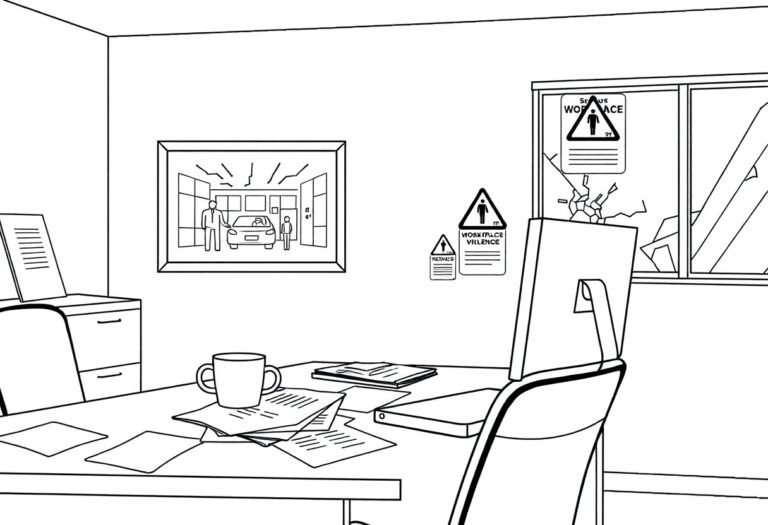Women with ADHD – Often Misdiagnosed or Missed
Women with ADHD face a unique set of challenges that can often lead to misdiagnosis or being entirely overlooked. You might find that your symptoms do not fit the traditional mould, resulting in feelings of frustration or inadequacy. This blog post aims to shed light on the distinctive characteristics of ADHD in women, offering insights into how you can better understand your experiences and advocate for your health. By recognising these challenges, you can take steps toward a more informed path to diagnosis and support.
Key Takeaways:
- Women with ADHD frequently exhibit different symptoms from men, leading to misdiagnosis or missed diagnosis.
- Often, emotional dysregulation and anxiety are more prominent in women, which can obscure the underlying ADHD.
- Social pressures and gender norms can influence how ADHD manifests in women, leading to underreporting and misunderstanding of their symptoms.
- Early diagnosis is vital for effective management, yet many women remain undiagnosed into adulthood.
- Increased awareness among healthcare professionals is imperative to recognise and address ADHD in women more accurately.
Understanding ADHD in Women
Your understanding of ADHD in women is imperative, as this condition often presents uniquely compared to men. Women may experience symptoms such as inattentiveness, anxiety, and emotional dysregulation, which can further complicate the diagnostic process. Many women with ADHD develop coping strategies that may mask their struggles, leading to a late diagnosis or a lack of recognition altogether. Recognising these distinct manifestations enables better support and interventions tailored to women’s needs.
Symptoms Commonly Misidentified
Around 80% of women with ADHD present symptoms that are frequently attributed to other mental health issues, such as anxiety or depression. This misidentification can lead to inadequate responses and therapies that do not address the root cause of their challenges. Symptoms like forgetfulness, disorganisation, and emotional instability are often overlooked, leading women to feel misunderstood and unsupported.
Differences in Diagnosis Compared to Men
To truly grasp the differences in diagnosis, it’s imperative to recognise that women often express ADHD symptoms differently than men. Women are more likely to internalise their struggles, which can lead to conditions like anxiety and depression being diagnosed instead of ADHD. This discrepancy results in a significant underdiagnosis of ADHD in women, with many remaining untreated and unaware of their condition.
Diagnosis Differences: Women vs Men
| Aspect | Women |
|---|---|
| Symptoms | Often internalised, leading to anxiety and sadness |
| Awareness | Many remain unaware of their condition |
| Diagnosis Age | Typically diagnosed later in life |
Also, the misdiagnosis and late diagnosis can result in long-term negative impacts, including low self-esteem and struggles in personal relationships. Women may also develop compensatory behaviours that mask their symptoms, making it challenging for health professionals to identify ADHD. This late recognition amplifies the need for informed assessment approaches, creating greater awareness amongst practitioners about how ADHD manifests in women, aiming for a more effective and supportive diagnostic process.
Comparative Diagnosis Overview
| Aspect | Men |
|---|---|
| Symptoms | More externalised behaviours, such as hyperactivity |
| Diagnosis Age | Often diagnosed in childhood |
| Support Systems | More awareness leads to better support |
The Impact of Gender Bias
Some women with ADHD face significant challenges due to gender bias within diagnostic practices. This bias often leads to symptoms being overlooked or misinterpretations of behaviour, as societal norms typically associate ADHD with hyperactivity and impulsiveness, traits more commonly recognised in males. Consequently, your experience may be dismissed or minimised, affecting both your self-esteem and access to appropriate support.
Societal Expectations and Their Influence
Before understanding how gender biases impact ADHD diagnoses, it’s imperative to recognise that societal expectations often dictate how women express their symptoms. You may feel pressured to conform to traditional feminine roles, leading to the suppression of symptoms or a misreading of your behaviour as simply being “too sensitive” or “overly emotional.” This societal lens can distort how ADHD manifests and is perceived.
The Role of Healthcare Providers
Role of healthcare providers is significant in diagnosing ADHD accurately in women. Your interactions with them can directly affect the level of understanding and empathy they demonstrate towards your symptoms. Some practitioners may carry their own biases, inadvertently dismissing or underestimating your struggles. Access to informed diagnosis and treatment can vary greatly, hinging on whether they recognise the distinct ways ADHD presents in women, highlighting the need for continuous education and awareness within the medical community.
It’s vital that healthcare providers acknowledge the unique ways ADHD manifests in women. If they lack knowledge about these differences, you risk receiving inadequate care or being incorrectly labelled, which can further exacerbate your challenges. Engaging in open communication with your healthcare provider about your experiences and advocating for a comprehensive assessment can lead to a more accurate diagnosis. Empower yourself through education about ADHD, as this may directly influence their approach and ensure that you receive the support you deserve.
Challenges in Diagnosis
Once again, diagnosing ADHD in women presents various challenges. Symptoms often differ from the traditional male presentation, leading to misinterpretations. Society typically views inattentiveness as less disruptive than hyperactivity, causing females to slip through diagnostic cracks. Without proper assessment, the condition remains unchecked, impacting your overall well-being and quality of life.
Overlapping Conditions
Diagnosis can be further complicated by overlapping conditions. Many women may experience co-existing issues, such as anxiety or depression, which can mask or mimic ADHD symptoms. This overlap often leads to confusion during evaluation, making it crucial for you to advocate for comprehensive assessments that consider the full spectrum of your experiences.
Adult versus Childhood Diagnosis
Among the notable distinctions in ADHD diagnosis is the difference between adults and children. Adults often present with subtler symptoms, which can lead to underdiagnosis. You may find that while childhood signs of hyperactivity fade, challenges with organisation and time management persist, affecting daily life significantly.
This transition from childhood to adulthood can create a unique set of challenges for you. As a child, ADHD symptoms are usually more apparent, such as impulsivity and behaviour issues. However, as you grow older, these symptoms may evolve into internal struggles, including difficulties with focus, procrastination, and emotional regulation. The lack of overt symptoms in adulthood can lead to a situation where you might not seek help, thinking that your struggles are simply part of growing up. Thus, having an understanding of how ADHD manifests at different life stages is vital for your diagnosis and subsequent management.
The Importance of Awareness
For many women experiencing ADHD, awareness plays a significant role in their journey towards understanding and managing the condition. Increased awareness can lead to better recognition of symptoms, reducing the likelihood of misdiagnosis. By fostering a deeper understanding of ADHD, both in society and among professionals, women can seek the resources and support they need to thrive.
Education for Healthcare Professionals
Awareness of ADHD in women must extend to healthcare professionals, who often lack training in recognising the nuanced symptoms. With more comprehensive education on this subject, professionals can improve their diagnostic accuracy, ensuring that women receive appropriate support and treatment tailored to their unique experiences.
Empowering Women to Seek Help
Healthcare providers have a necessary role in encouraging women to take control of their ADHD journey. By promoting understanding and awareness, you can break down the barriers that often prevent women from seeking help. It’s vital that women feel validated in their experiences, which can empower them to pursue appropriate evaluations and treatment options.
Education about ADHD plays a pivotal role in empowering women. It is necessary to highlight the signs and symptoms, encouraging you to trust your instincts when seeking help. Understanding your own experiences can lead to more informed discussions with healthcare providers, ensuring you receive the support needed. By advocating for your needs, you can challenge the stigma surrounding ADHD and actively participate in your own care, leading to improved outcomes and a better quality of life.
Treatment Options
Keep in mind that tailored treatment plans for women with ADHD often incorporate a combination of medication, therapy, and lifestyle adjustments. It’s important for you to work closely with your healthcare provider to determine the best approach that suits your needs and preferences. The journey to managing ADHD can be unique, and finding the right balance is crucial for your well-being.
Medication Considerations
By exploring medication options, you may find that stimulants are commonly prescribed for ADHD, as they can help improve focus and reduce impulsivity. However, it’s crucial to discuss potential side effects and individual responses with your doctor, as your experience might differ from typical patterns observed in men.
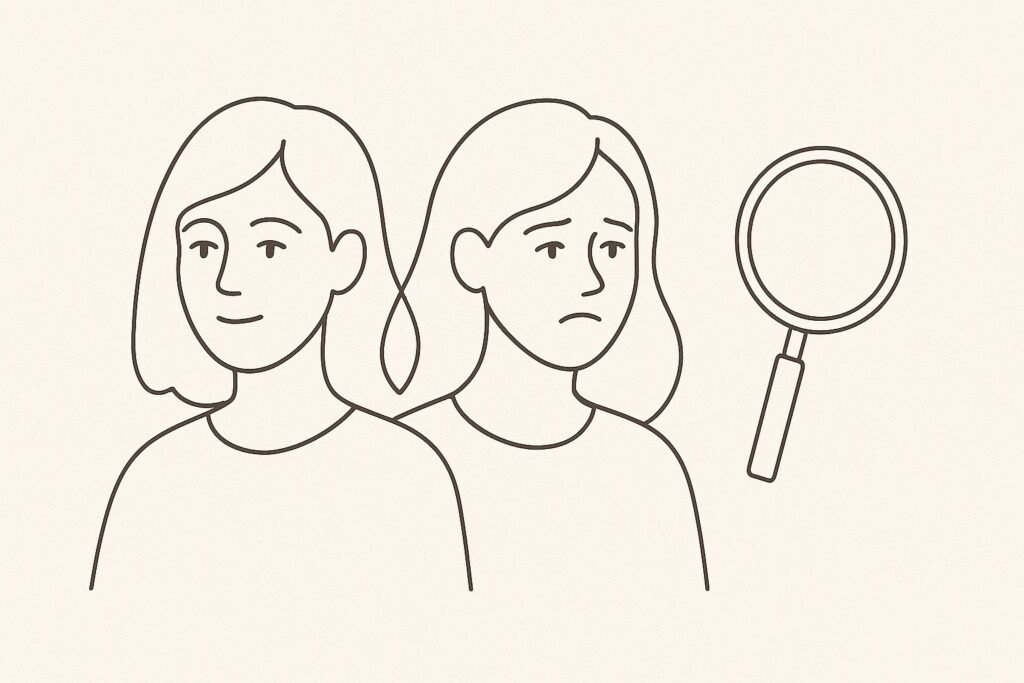
Therapy and Support Strategies
Engaging in therapy can be a beneficial facet of your treatment plan. You might benefit from cognitive behavioural therapy (CBT) to help address negative thought patterns and develop effective coping strategies tailored specifically for women struggling with ADHD.
Therapy provides you with a structured environment to explore your feelings and challenges associated with ADHD. It can help you develop effective coping mechanisms and enhance your self-esteem. Support groups and coaching can also offer a community where you share experiences, fostering a sense of connection and understanding. By learning about your ADHD in a supportive setting, you can realise your strengths and potential while managing day-to-day challenges more effectively.
Personal Narratives and Case Studies
Many women with ADHD share similar struggles, as evidenced by various personal narratives and case studies indicating the complexities of diagnosis and treatment. For instance:
- 1 in 5 women reported being misdiagnosed with anxiety or depression before receiving proper ADHD treatment.
- 73% of women noted that their symptoms worsened after hormonal changes, such as pregnancy or menopause.
- 58% of participants felt that their ADHD symptoms were not taken seriously by healthcare professionals.
- 2 in 3 women experienced difficulties in professional settings due to undiagnosed ADHD.
Experiences of Misdiagnosis
Above all, the experiences of misdiagnosis among women with ADHD highlight the pervasive stigma and misunderstanding surrounding the condition. Many women often find themselves labelled as over-emotional or disorganised, leading to their symptoms being attributed to other mental health issues rather than recognising the true root of the problem—ADHD.
Success Stories in Treatment
Along the journey of understanding ADHD, there are numerous success stories that illustrate the positive outcomes from appropriate diagnosis and treatment. Women who receive correct ADHD interventions report significant improvements in their daily lives, self-esteem, and relationships.
In addition, these success stories often reveal how tailored strategies, like behavioural therapy and medication, can dramatically transform your quality of life. Strong support networks consisting of family, friends, and ADHD coaches also play an integral role. These individuals have successfully embraced their challenges, leading to accomplishments such as thriving careers, improved mental health, and renewed self-confidence. Such inspiring accounts highlight how, with the right approach, women can flourish despite the complexities of ADHD.
Final Words
Hence, understanding that women with ADHD often experience misdiagnosis or missed diagnosis is vital for your awareness and advocacy. By recognising the unique ways ADHD manifests in women, you can better navigate the challenges and ensure that you or the women in your life receive the appropriate support and intervention. It’s necessary to seek professional guidance to address your needs and improve your quality of life.
FAQ
Q: What are the common symptoms of ADHD in women?
A: Women with ADHD may experience a range of symptoms, including difficulty with time management, disorganisation, emotional sensitivity, and challenges with focus and attention. Unlike men, women are often more prone to internalising their symptoms, leading to anxiety and depression. They may also display impulsive behaviour and have trouble maintaining relationships due to misunderstandings about their condition.
Q: Why are women frequently misdiagnosed or overlooked when it comes to ADHD?
A: Women are often misdiagnosed because their symptoms can present differently compared to men. Instead of hyperactivity, which is more commonly associated with ADHD, women may exhibit inattentiveness or emotional distress. There is also a societal tendency to attribute these traits to stress or personality rather than recognising them as signs of ADHD, leading to missed or incorrect diagnoses.
Q: How does ADHD in women impact their daily lives?
A: ADHD can significantly affect various aspects of a woman’s life, including her career, personal relationships, and self-esteem. Women may struggle with meeting work deadlines, managing home responsibilities, or maintaining social connections due to their symptoms. The internalisation of their challenges can lead to heightened feelings of inadequacy or frustration, often impacting their overall mental health.
Q: What steps can women take if they suspect they have ADHD?
A: If a woman suspects she has ADHD, it is advisable to seek a comprehensive evaluation from a mental health professional who is experienced with ADHD. This may include a detailed history of symptoms, assessments, and discussions about the challenges faced in daily life. Following diagnosis, a range of treatment options can be considered, including therapy, support groups, and medication.
Q: Are there specific therapies or strategies that work well for women with ADHD?
A: Women with ADHD can benefit from various therapeutic approaches such as cognitive behavioural therapy (CBT), which can help in developing coping strategies and practical skills. Mindfulness practices, organisational coaching, and peer support groups can also be effective. Additionally, establishing a structured routine and utilising tools like planners or digital reminders can aid in daily management of symptoms.

